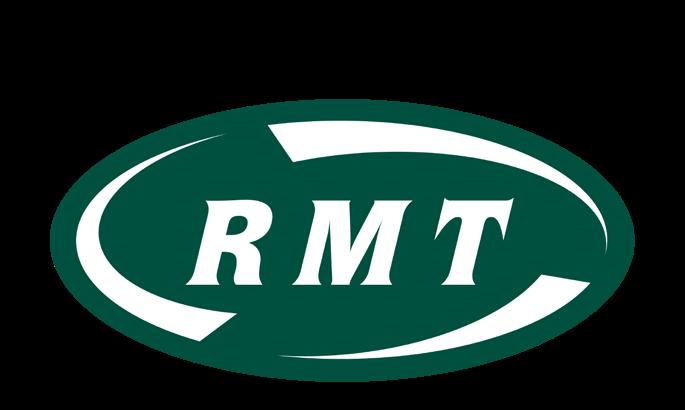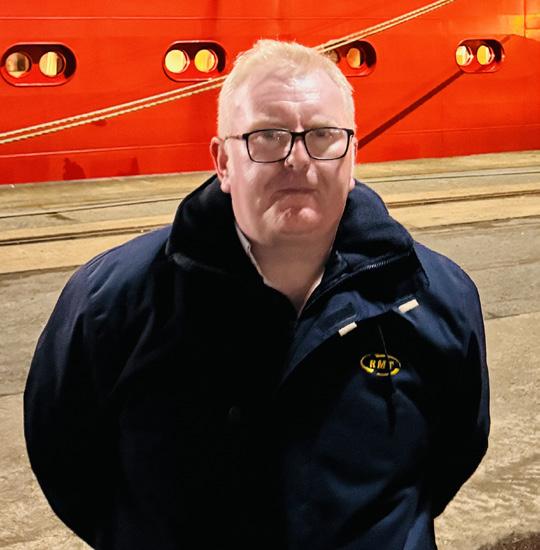







I hope that this update provides you with an informative overview covering various industrial matters, but also an understanding of what is taking place in the union outside of your workplace, how we might improve, how we may become more effective as a union and how we can encourage more members to become more actively involved in the union. The biggest threat to any employer is a well organised workforce with a high trade union membership density within the recognised trade union.
It is incumbent upon every member to ensure that your contact details and grade are up-to date. It is equally important that every member encourages those that are not in RMT to consider joining and making your workplace a stronger workplace Individuals may need to be reminded that the terms and conditions of employment that they enjoy today are a direct consequence of RMT’s negotiations over many years. We should also be mindful that it’s perfectly healthy to have differences of opinions and have debates within the workplace but sitting on the outside complaining and moaning will change absolutely nothing.
The biggest threat in any workplace, where our
members enjoy decent terms, is complacency. We must ensure that we continue to develop and progress your terms and conditions of employment so that when you pass the jobs over to the next generation of seafarers who will take over from you and your colleagues, you are handing over good quality jobs in a well organised workplace. Finally, I would like to ensure that we think about what we can improve our health and safety culture, having elected reps who are trained by RMT, participating in risk assessments, safety inspections and accident investigations are a fundamental aspect of a safer workplace. We must seek to ensure that we have this in place in every vessel where we organise and overcome any barriers to encourage members to ensure that you are safe in the workplace and that every member goes home safely to their loved ones.
As your national secretary, and current lead officer, it is fundamental to me that we are seen in the workplace, visiting members, this gives an opportunity for members to ask questions, understand what work we are doing within that sector, but also allows me to establish a greater understanding of your workplace environment and I look forward to undertaking some shipboard visits and seeing members employed at IOMSPCo shortly.
I can confirm that we have started engaging with your employer in relation to 2026 pay negotiations and as such we will provide a comprehensive report and feedback meetings to vessels following negotiations with your employer.
During negotiations with your employer recently it was pointed out that no other employers are utilising shared cabin space, this is not something that many other ferry operators have done for some time, and contrary to popular belief we do not have agreement with other companies on this issue because there is an expectation that seafarers are entitled to single occupancy cabins. This must be a talking point for RMT members, and we must establish a position as a collective. If those individuals who do not wish to be a part of the collective voice and are not a member of the union through choice, then that may form part of a solution that we can put forward.
Collective bargaining is a vital process where trade unions and employers negotiate over employment terms. RMT is recognised by IOMSPCo for ratings. Collective bargaining includes discussions on wages, working hours, work conditions, pensions and other employment-related issues. The aim is to establish equitable and mutually agreeable terms that protect the rights and interests of workers. It’s a process defined by negotiation, compromise, and mutual consent.
As many of you will be aware, Daren Ireland, who you may well have met as a lead officer for a period at the IOMSPCo, was elected as assistant general secretary earlier this year. As a direct result of that an election was triggered following internal debate and we can advise that Jimmy Brown (pictured right) has recently been elected. Jimmy has worked for Network Rail for many years and has been a very active and effective representative which will serve as a springboard for him to take up the position of regional organiser.

Your RMT membership entitles you to £5,000 of free cover which pays out if you should die because of an accident:
• Cover lasts for 12 months – annually renewable and always free
• Guaranteed acceptance for UK residents aged 18-69
• This policy is underwritten by Stonebridge International Insurance Ltd
Members can visit the RMT website for more information or contact the company directly by calling 0800 033 4184 for further information. Terms and conditions apply.
As a union we are unique in that we elect all our representatives from local workplace level to national positions. Most other unions appoint officials except for the general secretary, which must be an elected position. This is your opportunity as an individual to influence the outcome of an election. If you receive vote, then the position that you are being asked to vote on will have a direct influence in your area/region or grade. Members should be proud of our democratic structures and make every effort to use your vote in internal postal elections. t will take no more than 5 minutes to read, vote and place your vote in the post. For clarity the positions that maritime members will be asked to vote on are:
• General Secretary (5-year term)
• National Secretary (5-year term)
• Assistant General Secretary x2 (5-year term)
• President (3-year term)
• Assistant National Secretary (5-year term)
• Regional Organiser (5-year term)
• Relief Regional Organiser (5-year term)
• National executive committee member (3-year term)

So, the next time a ballot paper lands on your doorstep, take the time to vote and discuss this within your workplace.
As a workforce you must identify what the key issues are that you wish for your union to address. This may vary from shift to shift or even department to department, but we must be able to ascertain what your priorities are: this may be crewing issues, welfare standards, health and safety culture, accommodation or something vessel specific. As a union we must be able to identify what is concerning our members in each work location, this maybe specific to your vessel, specific to your company or it may be a broader issue that needs to be escalated in a particular direction. We should not become comfortable with what is good, we should be looking at what can be improved and what our strategy is to deliver improvements. It may be that your issue can be addressed with management, it may be that your issue can only be addressed through political intervention or lobbying, but in the first instance we need to establish what your priorities are and I would encourage members to discuss this matter and formulate a list of key issues that we can look to tackle proactively, and not reactively, to your employers’ agenda.
As the contract has now been exchanged between your employer and Stena Line it is important to recognise that RMT have recognition at Stena Line also and that we have a harmonious working relationship between both sets of employees. It should also be used as an opportunity to discuss terms and conditions of employment and understand if there are components within their terms that you would like to see negotiated in the future. with your employer.
As a union we recognise that we must evolve, we cannot stand still, what once worked, may not be as effective or have the same impact as it once did, this could be for any number of reasons, but we shouldn’t ignore this, nor should we accept it “because that’s the way it has always been”. An example would be communication, look how we communicate these days, compared to 5-10 years ago, yet have we improved how we communicate with members employed at IOMSPCo? Should we introduce video calling to provide updates for members? Would you like to see video updates? More digital newsletters? Encouragement of debates on issues of relevance? How do we modernise as a union to become more effective, better organised and ballot ready in the event of an industrial dispute or workplace injustice. We must recognise that we must move with the times but to do this we need views of members and engagement on what you want to see us improve. After all, YOU are the union!
It’s great to see apprentices being given opportunities once again at your employer and this will be something that we are keen to develop year on year. This is a subject that is emotive to many of our members and an under investment in training over the past 20 years has resulted in a mass skills shortage and industry seeking an over reliance on overseas seafarers and often exploited labour. Every company needs to invest and this is an issue that we continue to raise and develop in conjunction with your employer.
If members are not receiving correspondence from the union via text and email it is because we do not have your correct details. Quite often members will change jobs, change employers, change mobile number or email address and do not inform the union of these changes. To effectively communicate with our members, we need to ensure that the details we hold on file for you are up to date and correct. Members can easily update details by:
• Logging on to our website: www.rmt.org.uk/about/update-your-details/
• Email membership@rmt.org.uk and include your name, membership number (or national insurance number), along with your current address information.
• Call 0800 376 3706. Please have your membership details to hand when you call.
Members of IOMSPCo are organised through what the union terms as “spheres of influence” and is the responsibility of Douglas Shipping branch to effectively organise at your employer. Your branch is part of electoral region M2, and your representative NEC member is David Gwatkin.
Dave is currently employed by Stena Line and has worked at sea for 30 years, working for both Stena line and RFA as a steward, most recently onboard the Stena Adventurer out of the port of Holyhead. Dave is a member of Holyhead shipping and has been elected to the NEC until 31st December 2026. His Geographical electoral region is the North of England, republic of Ireland and Isle of Mann.
Dave can be contacted via email at NECregionm2@rmt.org.uk or on 07970 011561.

The following are benefits that are available to RMT members:
• Individual and collective representation within the workplace supported by local, regional, and national representatives.
• Full representation at disciplinaries, grievances, flexible working request meetings, welfare meetings, and attendance management hearings.
• Better pay.
• Improved conditions.
• Health and safety protection.
• Legal cover – workplace and criminal for members and their families.
• A credit union
• Accident benefit
• Orphan benefit
• Retirement benefit
• Free will service
• Death grant
All member benefits can be found on the website at www.rmt.org.uk
It is important to remind those not in the union of the benefits of being in the union and also raise awareness amongst our current membership of the benefits that RMT as a trade union offers.
Most members will know that conducting industrial action ballots is a very important part of the union’s strategy in defending members’ terms and conditions and that it is fraught with legal difficulties. Here, we explain this with information on the balloting process to assist members’ understanding of the complexities.
First of all, when a report is received from your regional organiser or a resolution comes from your RMT branch, this will be placed before the national executive committee for consideration and if it decides to declare a dispute with the company, we write to the company listing the issues in dispute. This forms the first part of the legal notices. Then the NEC may take a decision to conduct a ballot for industrial action, which can consist of strike action and/or industrial action short of a strike. It is usually beneficial to ballot members for both forms of action to give more options later on but this does not mean that any action will
necessarily be called.
A legal notice of ballot, ballot paper and ballot info sheet are then drafted. This starts with an exercise to make sure all members’ details are correct including their workplace, job title and contact details. This is especially important as the company is notified of the number of members at each workplace, the number of members in each job category and the total number of members concerned – if this information is not correct it can lead to the company challenging the ballot and in some cases, means we have to call off the ballot and start again. We also need all members’ current addresses as ballots are legally obliged to only take place by post. Plans are in place to allow online voting but that is not part of the current legislation.
Each member included in the ballot will then be sent a ballot paper and ballot info sheet by post from Civica Election Services with a freepost return envelope. These will give the member the opportunity to vote for industrial action and the ballot info sheet provides further information on the dispute. We can send out replacement papers to any member who hasn’t received them during this period, either through them being lost in the post or they have changed address.
On the ballot closing date, Civica Election Services will send a report of voting to head office giving the result. Under the current legislation, 50% of the total number of members who were balloted must have returned their ballot and 40% of the total number of members who were balloted must vote ‘yes’ for action to be able to take place. You will receive reminders from us during the voting period as if we don’t meet these thresholds then the ballot will fail.
Once a successful ballot mandate has been achieved, which meets the above criteria, the NEC can then take a decision to call industrial action, and we then send the legal notice of action to the Company and inform members of the details of the action.
The whole process, from sending the notice of ballot, to the first possible date for industrial action, takes at least 6 weeks. A week between the notice of ballot and ballot papers posted to members, 3 weeks balloting period, then two weeks’ notice of action before the action starts. After 6 months from the ballot closing date, the ballot mandate expires, and we have to re-ballot members again from scratch if we want to continue taking industrial action.
Referendums have no legal standing. They are carried out according to the rules of the union and through decisions taken by the NEC and government legislation has no bearing on the process. They can vary in length, depending on how quick union negotiators or NEC want them to be and can also vary depending on the constituency taking part. They are carried out online and all members are sent an email with a voting link, which contains a passcode allowing them to take part. Members must have an email account to take part, and they are sent all the relevant information relating to the vote, including full details of the proposals subject to that vote, by email.
The results of the referendums are then placed back in front of the NEC, which notes the outcome and instructs the general secretary to advise members of the result. Head Office staff strive to act on results of referendums as quickly as possible after the NEC has considered them.
